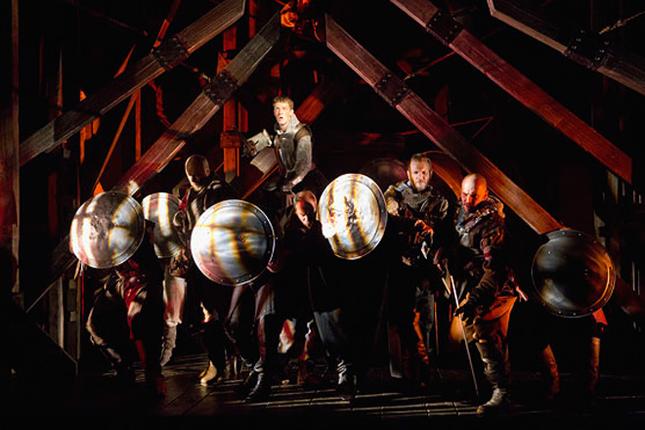Zach Appelman Stuns as Henry V at the Folger
By • August 15, 2013 0 1556

Zach Appelman is a lot of things.
He’s a native Californian, an actor, and a onetime student. He’s even got a black belt in karate.
On his website you see a group of photos as well as his official photo, reddish brown hair, intense, clear blue eyes. The other photos are roles he’s played, people he’s been, a man in an 18th-century wig, a World War I soldier (Sgt. Fine in the Broadway production of “War Horse”), a bare-chested, muscled guy in mid- scream it seems, a regular guy in a checkered shirt, a studious-looking man in a 19th-century coat, a tense man in uniform, a laughing man, mouth wide open.
In his younger years, he has played many parts, been many people—Biff, one of Willy Loman’s sons in “Death of a Salesman” at the Chautauqua Theatre, directed by Ethan McSweeny, a Shakespeare Theatre favorite here; a bit in the hugely popular series “Homeland” as the vice-president’s aide, a part in the independent film “Kill Your Darlings”, out this year, with Daniel Radcliffe.
He has been in the Shakespeare chronology, Francis Flute, Tybalt, Surrey and Salisbury, Silvius, Edmund, Dromio of Ephesus and Alcibiades in the Chicago Shakespeare Theater, the Chautauqua Company, the Yale Repertory Theatre, the Theatre Artists Group, and at Shakespeare Santa Cruz. At the Yale School of Drama, he’s been Ferdinand, Orlando, Oberon, and Chebutykin in ‘Three Sisters” and Aslak” in “Peer Gynt”
To name a few.
Today, here and now, Zach Appelman is the king.
He has the title role in the Folger Theatre production of Shakespeare’s “Henry V”, directed by Robert Richmond, who directed successful productions of “Othello” and “Henry VIII” at the Folger, and who chose Appelman for the part.
Not every man or actor can be and play the king, especially this king, the heroic king, the king played by many young actors, including some very famous ones: there’s Kenneth Brannagh in HIS movie version, which some saw as an anti-war film, and there’s Sir Laurence Olivier’s patriotic 1940s film version.
“Yeah, those are big shadows, I suppose,” Appelman says. The voice on the phone is youthful, confident, engaging. “You have to find your own way into the part, bring it to yourself, to your own time. I think Henry is a very complicated man, it’s a complicated part, it’s not just the speech, the St. Crispin’s day speech, ‘we band of brothers.’ The play is so familiar, and that speech is so familiar, it’s been said and spoken and memorized by so many people.”
“You start with the text, and you find some very interesting things,” Appelman said. “This is the Henry now king, but still a part of him is the Henry hanging out with the ruffians in the taverns, with Falstaff, in “Henry IV”. One quality I’ve found is that he hides things from others, he’s secretive, he can’t just show himself, he likes disguises, especially when he’s king, and now, he has to be a leader, and be seen as a leader, he’s had to already deal with a conspiracy, and now he’s in France, and can’t be everyone’s friend, he’s the king. I think a lot of people think of this as a war play, or an anti-war play, but it’s not just about that. There’s tragic qualities to this, there’s so much humor.”
“It’s a lot of responsibility, and a major challenge,” he said. “I’ve done a lot of Shakespeare at Yale, in regional theatre, and different parts. If you’re my age—27, and by the way, that’s the age Henry was at this time in the play—you get a lot of the swains, the men that the women in the comedies fall in love with, the young guys. There was a production of “The Tempest” which I auditioned for and I got Ferdinand and I was kind of disappointed because I would have liked to have done Caliban, something meaty like that. I was told that giving life to the Ferdinands or the Orlandos, making them interesting and getting people to pay attention was the kind of thing that made you a good actor
“Same thing with Henry, he’s a lot more than the hero king, he has to be all things to all people, and that includes making decisions that affect people he cares about, he has to be the courtier with the French king’s daughter, a courtship that can be very funny.”
Appelman grew up in San Francisco Bay Area, in Palo Alto, home to Stanford, and first tried acting in college, which swept him on the road to a career.
He sounds perceptive, and thoughtful about his craft and how it echoes. “ This is first time here. I think Henry is one of those people who’s had to learn to be a leader, and that’s a theme that certainly echoes here in Washington at this time. I haven’t had much of a chance to explore the city, but there’s been a lot going on right now—the inauguration, and all the excitement around it—but we’ve been rehearsing. But that’s what we have now—a divided country, opposing forces or parties, it echoes strongly. “
Looking at his record—BFA from UC Santa Barbara, MFA in Acting from Yale School of Drama, a stint with the Adcademia Dell’Arte, honing his stage combat skills, listing as special skills juggling, dialects and accents, and playing blues, rock and folk guitar—you get a sense of an actor working to enrich his abilities and craft.
Which sort of fits—a president has to learn to be a leader, a king has to learn to rule, and an actor brings everything he has to the task of being a king on stage.
“Henry V” continues at the Folger Theatre through March 3.

